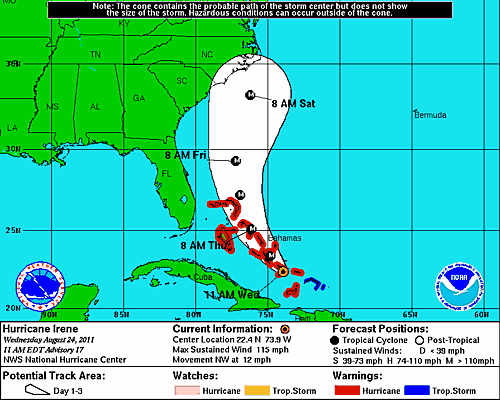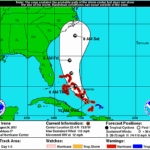

As Hurricane Irene barreled toward the eastern seaboard and North Carolina’s coast, local communities and state and local officials braced for a potentially significant hit. Hyde County declared a local state of emergency. Under its declaration it ordered a mandatory evacuation for visitors and a voluntary evacuation for county residents beginning early Wednesday morning. The evacuation order becomes mandatory for everyone in the county early the following morning. Hyde’s declaration also authorized local and state law enforcement to restrict access to Ocracoke Island. Other local governments follow suit in the coming hours and days (depending on the track and intensity of the storm), ordering voluntary and mandatory evacuations, and restricting access to high-risk areas.
Local officials are authorized to order mandatory and voluntary evacuations, but can they enforce them?
If you search the North Carolina General Statutes for reference to a “mandatory evacuation,” you will find this term in the North Carolina Emergency Management Act (G.S. Chapter 166A) along with the term “voluntary evacuation.” Both the governor (with the concurrence of the Council of State) and cities and counties have specific authority to order mandatory and voluntary evacuations under a state of emergency declaration. Specifically, the governor or a city or county can, under a state of emergency declaration, “direct and compel the voluntary or mandatory evacuation of all or part of the population from any stricken or threatened area within the State, to prescribe routes, modes of transportation, and destinations in connection with evacuation; and to control ingress and egress of a disaster area, the movement of persons within the area, and the occupancy of premises therein” (G.S. 166A-19.30(b)(1) for the governor; G.S. 166A-19.31(b)(1) for cities and counties). These authorities are included among the broad powers to impose emergency restrictions and prohibitions granted to the governor, cities, and counties under state of emergency declarations (see this post about other emergency restrictions that may be imposed).
So, the governor or a city or county can order a mandatory evacuation, but can they enforce it? North Carolina law does not go so far as the law of Texas, which specifically provides that a county judge or mayor of a municipality who orders a mandatory evacuation “may compel persons who remain in the evacuated area to leave and authorize the use of reasonable force to remove persons from the area.” (Tex. Government Code § 418.185) Use of force is not specifically authorized under North Carolina law to compel evacuations. However, a violation of restrictions and prohibitions imposed under a state or local state of emergency declaration is punishable as a Class 2 misdemeanor (G.S. 14-288.20A). An individual refusing to comply with a mandatory evacuation order, or any other restriction such as a curfew or limited access to a stricken area, imposed during a declared state of emergency can be charged with either a Class 2 misdemeanor. These provisions give state and local officials an enforcement mechanism – literally, the power to arrest – should such drastic measures be warranted.
Of course, state and local officials are not likely to order the mass arrest of individuals who refuse to heed a mandatory evacuation order. This does not mean that mandatory evacuation orders should be ignored. Local officials do not issue such orders lightly; evacuations are logistically complex operations that require careful coordination across local and even interstate jurisdictional boundaries. The loss of income and disruption to visitors and residents is most often substantial. Taking these factors into account, local officials order evacuations only when necessary in the face of a significant threat in order to protect the lives of their residents and visitors. Reasons given by local officials to heed evacuation orders include:
- Possibility of injury and death during the storm;
- Increased safety risks to first responders and law enforcement who may be required to respond to 911 calls or rescue stranded disaster victims who failed to heed the evacuation order;
- Inability to respond to calls for assistance during the storm because of safety risks to emergency personnel (for example, many coastal jurisdictions will cease public safety services after sustained winds reach 50 mph; it is unsafe to operate emergency response vehicles under such conditions);
- Stretching already limited personnel and resources to provide assistance to individuals in the immediate aftermath of the storm;
- Threats to public safety from damaged and destroyed infrastructure such as roads and utilities; and
- Limited access to public service facilities, medical facilities, and essential businesses such as grocery and drug stores.
Those who choose to not comply with official warnings to get out of harm’s way, or are unable to, should prepare themselves to be fully self-sufficient for the first 72 hours after the storm. For more information on preparing for a hurricane, check out the Red Cross’s Hurricane Safety Checklist. Additional emergency management and disaster relief agencies are listed on the SOG’s Knapp Library emergency management resource cite.